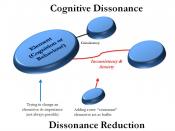What is "cognitive dissonance"? Cognitive is defined as, "relating to, being, or involving conscious intellectual activity (as thinking, reasoning, or remembering)." (Cognitive, 2009) Dissonance is defined as, "an inconsistency between the beliefs one holds or between one's actions and one's beliefs." (Dissonance, 2009) Therefore, cognitive dissonance is a known inconsistency between the beliefs one holds and his or her actions. An example of cognitive dissonance is a person whom smokes cigarettes despite the knowledge of the negative effects on his health and the health of others around him. A smoker would normally feel dissonance with every cigarette he or she smokes, as medical professionals are continually warning of the harmful effect of cigarettes. Generally, the person would feel the negative social cues and begin to either modify the negative behavior or justify it.
Cognitive DissonanceAn individual can have cognitions about, for example, behaviors, attitudes, beliefs or feelings and the cognitions can be, for example, about oneself, another person, a group or general topics.
Cognitive Dissonance is not a logical principle but rather a psychological one. This means, that it is often impossible to give a rational explanation for a behavior, an opinion, or a decision which has been made. Therefore, one person may feel dissonance about a certain aspect whereas another person may think it is consonant. (Harmon-Jones & Mills, 1999) When, for instance, a decision between two similar goods has to be made one alternative will be weigh against the other and the one which is considered to be the best will be taken. After having bought the product, however, the owner will probably experience cognitive dissonance as he or she might no longer be sure whether the decision was right or wrong. To make sure that the decision was right the person can now search for positive...


